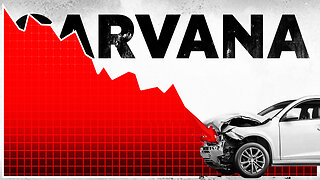Premium Only Content

'The Shape of Things to Come' (1933) by H G Wells
The Shape of Things to Come (1933) by H.G. Wells is a speculative, futuristic novel presented as a fictional history. The book chronicles humanity's trajectory from the 20th century into the 22nd, portraying a dystopian world that ultimately evolves into a utopian society. It reflects Wells's vision of technological progress and its social consequences, with a blend of optimism and caution.
The novel is structured as if it were a historical account based on dreams experienced by a man named Dr. Philip Raven. Raven's visions encompass key world events over two centuries. Key elements include:
1. Collapse of Civilization:
The novel begins in the aftermath of World War I, exploring the economic, political, and social chaos that ensues globally.
A devastating second world war and a subsequent global pandemic exacerbate humanity's decline. The resulting collapse of traditional nations leads to widespread anarchy and suffering.
2. Rise of a Technocratic Elite:
Amid the chaos, a new ruling class of scientists and engineers, referred to as "The Air Dictatorship," emerges.
Using advanced technology, this elite group gradually stabilizes the world, suppressing nationalism, war, and outdated religious institutions.
3. Transformation into a World State:
The Air Dictatorship evolves into a World State, prioritizing reason, science, and planned progress.
The rulers implement sweeping reforms, including the abolition of private property, a focus on education, and the establishment of a universal language.
4. Challenges and Ethical Questions:
The novel delves into the moral dilemmas of wielding absolute power, exploring whether authoritarianism can be justified for the greater good.
Resistance from traditionalists and remnants of the old order poses challenges to the World State's vision.
5. Utopian Future:
Over time, humanity transitions into an egalitarian utopia characterized by harmony, technological innovation, and intellectual enlightenment.
The novel concludes with a hopeful vision of a unified, peaceful, and progressive world.
Wells uses the narrative to critique the failings of his contemporary society, particularly its reliance on nationalism, militarism, and irrationality. The book also reflects his belief in the transformative power of science and rational planning, though it raises complex questions about the ethics of centralized control.
-
 14:26
14:26
Upper Echelon Gamers
3 hours ago $0.13 earnedThe Carvana Scam - A Predatory BUBBLE
1133 -
 LIVE
LIVE
LFA TV
20 hours agoLIVE & BREAKING NEWS! | FRIDAY 11/14/25
1,097 watching -
 LIVE
LIVE
Dr Disrespect
6 hours ago🔴LIVE - DR DISRESPECT - BLACK OPS 7 - LAUNCH DAY CHAMPION
1,123 watching -
 LIVE
LIVE
StoneMountain64
4 hours agoCall of Duty Black Ops 7 Gameplay LAUNCH DAY
200 watching -
 18:15
18:15
Clintonjaws
5 hours ago $3.25 earnedCNN Audience Shocked By Dem's Slanderous Comments At Trump
24.2K19 -
![MAHA News [11.14] - Govt War on Small Ranchers, GLP-1 Craze, Hemp Ban, Mercury out of Vaccines](https://1a-1791.com/video/fww1/f2/s8/1/i/X/E/z/iXEzz.0kob-small-MAHA-News-11.14.jpg) LIVE
LIVE
Badlands Media
12 hours agoMAHA News [11.14] - Govt War on Small Ranchers, GLP-1 Craze, Hemp Ban, Mercury out of Vaccines
491 watching -
 1:23:17
1:23:17
The Quartering
5 hours agoTucker Reveals FBI Coverup For Trump Assassin, Walmart CEO Quits & Tim Pool Unleashes
55K59 -
 34:23
34:23
Tucker Carlson
9 hours agoWho Is Thomas Crooks?
338K494 -
 2:05:33
2:05:33
The Culture War with Tim Pool
19 hours agoDating In The Modern Age DEBATE, Myron Gaines vs Brian Shaprio | The Culture War LIVE Debate
100K152 -
 1:10:18
1:10:18
Sean Unpaved
5 hours agoTreVeyon Henderson Scores 3 TD's As Patriots DOMINATE Jets! | UNPAVED
29K3